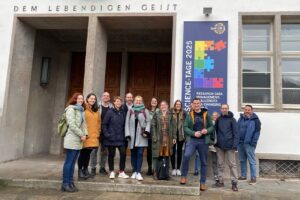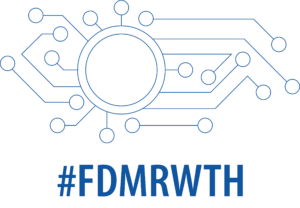The E-Science Days 2025 took place in Heidelberg from March 12 to March 14, 2025 under the motto ‘Research Data Management: Challenges in a Changing World’. The event offered both online and face-to-face participation and served as an interdisciplinary platform for dialogue on research data management (RDM) and open science.
The diverse programme included many different formats such as lectures, lightning talks, poster sessions and workshops. The keynote speeches and the panel discussion, which highlighted current topics such as ensuring data quality, challenges in data publication and the opportunities and risks of artificial intelligence (AI) in RDM, attracted particular attention.
In this blog series, we take you on a journey through three eventful days, which the RDM team at RWTH Aachen University was able to experience intensively.
The first day offered a wide range of workshops with interactive sessions on current developments, best practices and innovative approaches that were presented and discussed. The day was characterised by an intensive professional exchange and practical insights into various tools and concepts. In the afternoon, participants had the opportunity to take part in various workshops and get actively involved.
Workshops in the First Session: Error Culture, Structures, Cloud Technologies and AI
Celebrating Mistakes: The Potential of an Open Error Culture in the Field of Research Data
The workshop emphasised the need for a positive error culture in research. Errors are unavoidable, but dealing with them transparently can contribute to better data quality standards and more open science. Participants discussed how researchers can be encouraged to disclose errors without fear of negative consequences.
Interoperable RDMO Catalogues with the NFDI DMP Template Framework
The workshop focused on the standardisation of data management plans (DMPs) with RDMO. A framework was presented that enables the creation of interoperable DMP templates to facilitate the exchange of research data. Participants had the opportunity to work hands-on with the creation of standardised catalogues.
Managing FAIR Microscopy Data at Scale
Bioimaging data carries certain unique challenges: manual data annotation, data stacks pose storage issues due to their size, and many vendors provide their own format. I3D:bio – Information Infrastructure for BioImage Data aims to assist institutions with the bioimage RDM, for example, by implementing the imaging data management platform Omero. They provided a hands-on demo of this tool which assists researchers in organizing and annotating their imaging data. Furthermore, OME-Zarr was demonstrated, a file format that aims to tackle the handling of large data in the form of image stacks. Finally, common repositories, including the BioImage Archive (BIA) and the Image Data Repository (IDR) were introduced. This workshop provided valuable information and resources including the contacts for NFDI4Bioimage Data Stewards to help researcher and RDM personell alike.
Information Infrastructures in the Era of Artificial Intelligence
This workshop analysed how AI influences the management of research data. An introduction to the research work of the Leibniz ScienceCampus ‘Digital Transformation of Research’ was followed by a panel discussion with experts. The participants discussed the opportunities and challenges of AI in science and the impact on the transparency, quality and reproducibility of research results.
Helpdesk Cooperation between State Initiatives and the NFDI
This workshop focussed on the networking and coordination of RDM helpdesks at local, regional and national level. Concepts for better cooperation were developed in working groups on the topics of information requirements, workflows and technology.
de.KCD: A Competence Center for RDM and All Things Cloud
The competence centre for cloud technologies (de.KCD) was presented in this workshop. Participants were given an introduction to cloud-based data analysis tools such as SimpleVM, Jupyter Notebooks and Galaxy to efficiently process research data and develop sustainable, scalable workflows.
Workshops of the Second Session: ELNs, Metadata, NFDI Services and FDM at HAW/FH
ELN Material Collection Hackathon: Electronic Lab Notebooks for Research
Electronic lab notebooks (ELNs) are indispensable for the structured documentation of research results. The workshop presented the ‘ELN Material Collection’, an open knowledge platform to support ELN implementation. In an interactive hackathon, the participants actively contributed to the expansion of the resource collection.
Metadata Explained in a Playful Way: Brick by Brick with LEGO
An innovative approach to teaching metadata standards was implemented using LEGO bricks. Practical exercises illustrated why structured metadata is crucial for the findability and reproducibility of research data.
NFDI Basic Services: Interoperable Solutions for Science
The NFDI Basic Services were presented as central technical and organisational solutions for interdisciplinary research. Special focus was placed on IAM4NFDI (Identity & Access Management) and DMP4NFDI (Data and Software Management Plans). Participants were able to discuss their own use cases and formulate requirements for future services.
RDM at Universities of Applied Sciences (HAW/FH)
The development of RDM competences and structures at HAW/FH was a central topic of this workshop. The FDM@HAW network presented strategies for better integration of RDM at universities. Best practices were exchanged and concepts for the sustainability and further development of the network were developed.
Evening Program
After an intensive day of workshops, participants were able to choose from four exciting evening programmes. These highlighted the scientific and historical aspects of Heidelberg University.
- Guided tour of the Mathematikon: Insights into the architecture and research of the Mathematikon with a focus on interdisciplinary science.
- Guided tour of the University Archives: A journey through the history of Heidelberg University using historical documents.
- Services of the University Library: A presentation of the wide range of services offered by the University Library followed by a guided tour of the library.
- University history city tour: A walk through Heidelberg with a focus on the university’s rich history.
Conclusion
The first day already left a lasting impression on the participants, as it impressively demonstrated how cooperation, open science and innovative formats can sustainably improve research data management and digital infrastructures.
The combination of lectures, interactive workshops and practical exercises enabled an in-depth exchange between the participants from different disciplines.
The lively exchange not only provided professional impetus but also strengthened new collaborations and networks. These will have an impact far beyond the event.
In the next article, we will guide you through the second day of the E-Science Days 2025 – stay tuned!
Responsible for the content of this article is Arlinda Ujkani.






Leave a Reply
You must be logged in to post a comment.